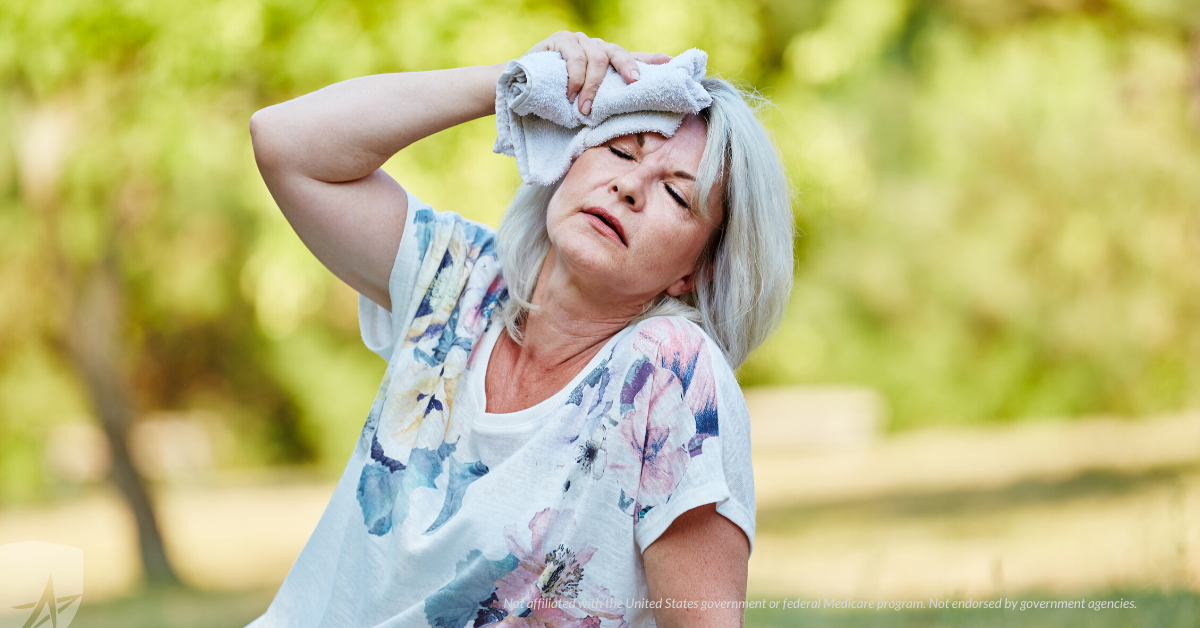
As temperatures increase, so do the risk factors for heat-related health problems with elderly adults and individuals with chronic illnesses. If you are on Medicare or Medicare-eligible, follow these simple summer safety tips to help stay cool and well through hot summer months.
Top Summer Safety Tips for Seniors:
Protect Your Skin from Too Much Sun
Skin cancer is the most common cancer in the U.S. According to the Skin Cancer Foundation, 1 in 5 Americans will develop skin cancer by the age of 70. The leading cause of most skin cancers – too much exposure to ultraviolet (UV) light. Overexposure to harmful UV light is a leading risk factor for all types of skin cancer, including melanoma.
By limiting your exposure to full sun as a senior, you can help reduce your exposure to dangerous UV rays and lower your risk of developing skin cancer. Stay in the shade, wear loose protective clothing and hats, and wear sunscreen when you can (SPF 15 or higher is recommended). Sunglasses can also help protect your eyes from harmful UV rays, and help reduce the risk of cataracts. Wearing sunglasses that block both UVA and UVB rays offers the best protection.
Stay Well Hydrated
Seniors are more at risk for dehydration than younger adults for a number of reasons. From lowered thirst response to an overall decline in body fluid and decreased kidney function, older adults are more prone to hydration issues.
Being underhydrated as a senior can also lead to other health complications and even preventable emergency room visits. One study by UCLA found that up to 40% of seniors, especially community-dwelling seniors, may be chronically underhydrated. Not being properly hydrated can lead to constipation, kidney problems, urinary tract infections (UTIs), and even loss of balance, which could result in dangerous falls and possibly hospital admittance.
Stay well hydrated this summer by drinking plenty of water each day. The general recommendation for older adults is to drink at least 1.7 liters per day, which equals about 7.1 8oz cups of water each day.
Avoid Too Much Heat Exposure
Elderly adults are at a much higher risk of heat-related illnesses during the summer. According to the National Institutes of Health (NIH), seniors are more at risk for heat stroke, heat edema (swelling of the feet and ankles), heat cramps, heat exhaustion and sudden dizziness after excercising in the heat, known as heat syncope.
Older adults, especially those heart, lung and kidney disease, should take extra precautions during hot weather. It is recommended for seniors to stay in air conditioned spaces on particularly hot and humid days, and avoid overexertion outside, especially on hot afternoons. Do outdoor activities such as gardening and walks in the morning or evening, when the sun is lower in the sky and outdoor temperatures are lower.
Elderly adults who take various medications, or who have high blood pressure, should be especially careful, as prolonged heat exposure could lead to extra dehydration and dizziness.
Stay Safe in Hot Weather
If you are concerned that you or someone you know is suffering from a heat-related illness, it is important that you speak up and seek medical care. Get the person out of the heat and into a cooler, shaded area. Apply a cold, wet cloth to key areas of the body such as the wrists, neck and armpits to help bring down their body temperature. Drink cool, clean fluids if possible, such as water and fruit or vegetable juices, but avoid fluids with caffeine or alcohol.
Too much heat is not safe for anyone. Seniors are especially at risk for dangers due to heat exposure, and should take extra care to avoid dehydration, dizziness and more serious complications as a result such as falling. You can get more information here on hot weather safety for older adults. You can also consult with a senior health plan specialist in your area to make sure you covered for preventative care, prescriptions and hospital care in the event of an emergency. Talk to your local broker to make sure you stay cool and covered this summer.
The post Summer Safety Tips for Seniors appeared first on Trusted Medicare Answers.
